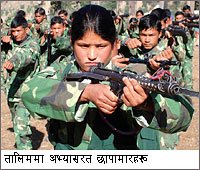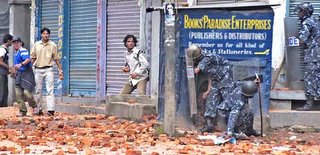The following is from:

12/22/05, RED RPG <http://us.f305.mail.yahoo.com/ym/Compose?To=peoples_war@yahoo.co.uk> wrote:
Maoist Information Bulletin- 10
(Occasional Bulletin of Communist Party of Nepal (Maoist)
SHORTS NOTES ON 12 POINT UNDERSTANDING
While Communist Party of Nepal (Maoist) has historically concluded the plenum of Central Committee, the glorious political step forward has held in Nepal. CPN (Maoist) and seven parliamentary parties have reached in some understanding for fight against old fierce autocratic regime and establishing full democracy and peaceful republic of Nepal. It is a great achievement for new political system in Nepal. The long struggle between absolute monarchy and democracy in Nepal has now reached in a very momentous and new turn.
Maoist revolutionaries and parliamentary parties are agreed on implementing the concept of absolute democracy through a forward-looking restructuring of the state has become an inevitable need to solve the problems related to class, caste, gender, region etc of all sectors including political, economic, social and cultural, bringing autocratic monarchy to an end and establishing absolute democracy. The 12 points understanding is a devastating blow to old regime Gynendra and his butcher company. It is breaking the existing political confusion and darkness, has provided people a torch in their hand and it will go on blazing till the autocracy turns into ash.
Chairman Prachanda assured that it represents a preliminary political step but a step of far-reaching significance towards the direction of building up a broad democratic front against autocratic feudalism in the country. It is a historical success of flexible tactic, which has concluded by recent CC plenum.
The understanding reflects some important achievements: the parliamentary parties have significantly signed up on against autocratic feudalism in the country by building up a broad democratic front. They are agreeing to establish democratic system through the election of constitution assembly and transfer state power completely to the people. In understandings no 2 "The seven agitating parties are fully committed to the fact that only by establishing absolute democracy through the restoration of the Parliament with the force of agitation, forming an all-party government with complete authority, holding elections to a constituent assembly through dialogue and understanding with the Maoists, can the existing conflict in the country be resolved and sovereignty and state power completely transferred to the people. It is the view and commitment of the CPN (Maoist) that the above mentioned goal can be achieved by holding a national political conference of the agitating democratic forces, and through its decision, forming an interim government to hold constituent assembly elections. An understanding has been reached between the agitating seven parties and the CPN (Maoist) to continue dialogue on this procedural work-list and find a common understanding. It has been agreed that the force of people's movement is the only alternative to achieve this."
Similarly, parties and Maoist revolutionaries are also harmonizing as that "the country has demanded the establishment of permanent peace along with a positive solution to the armed conflict. Therefore, we are committed to ending autocratic monarchy and the existing armed conflict, and establishing permanent peace in the country through constituent assembly elections and forward-looking political outlet. In this very context, an understanding has been reached to keep, during the holding of constituent assembly elections after ending autocratic monarchy, the armed Maoist force and the royal army under the supervision of the United Nations or any other reliable international supervision, to conclude the elections in a free and fair manner and accept the result of the elections. We expect reliable international mediation even during the dialogue process."


No comments:
Post a Comment